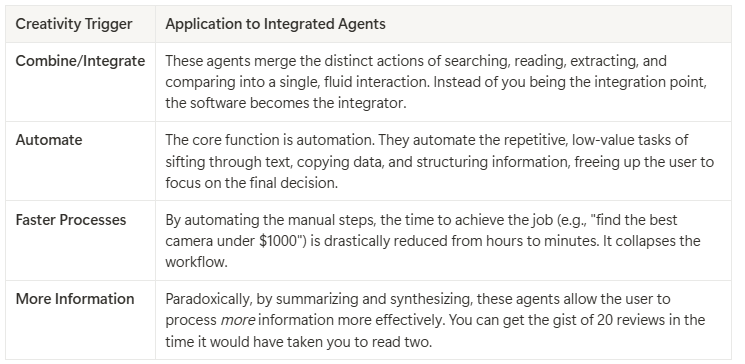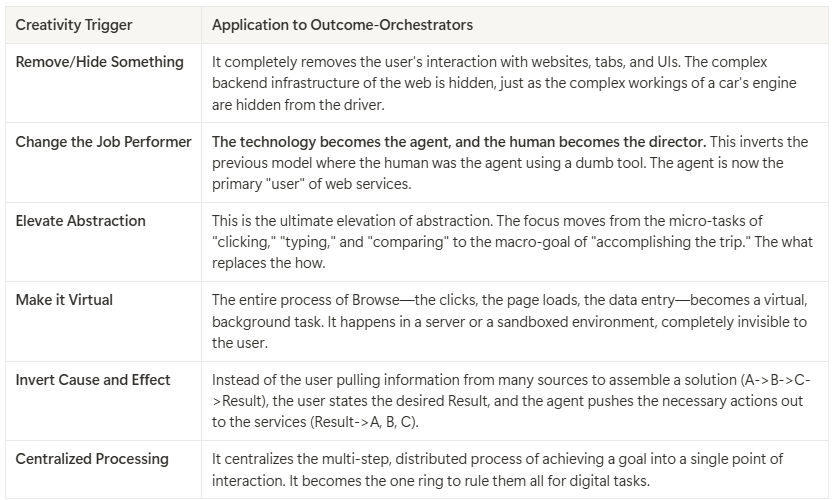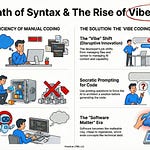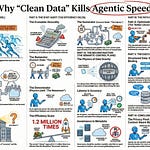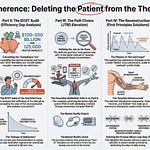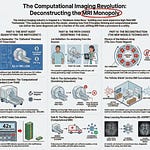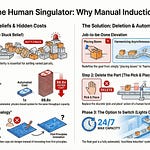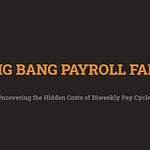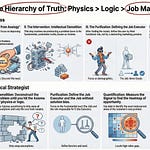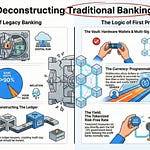The traditional web browser is becoming obsolete. As we shift from navigating information to achieving outcomes, a new paradigm is emerging—one driven by intelligent agents that get jobs done. Here’s what the future holds and how to prepare for it.
Table of Contents
Introduction: The End of an Era
The Job-to-be-Done of "Browse"
Deconstructing the Job We Hire a Browser For
The Struggle is Real: Why the Current Paradigm is Failing
Elevating the Abstraction: The Real Job
The Rise of the Agentic Web: Two Glimpses into the Future
Concept 1: The "Now" State - The Integrated Agent (Working Today)
Concept 2: The "Next" State - The Outcome-Orchestrator (The Novel Leap)
Strategic Implications for a Post-Browser World
For Users: A New Kind of Literacy
For Developers: Your UI is Now an API
For Businesses: Innovating Beyond the Webpage
Conclusion: Don't Build a Better Browser, Build a Better Outcome
Introduction: The End of an Era
We are at a pivotal moment in our relationship with technology, one that feels eerily similar to the revolutionary shift from the blinking cursor of MS-DOS to the point-and-click world of graphical user interfaces. For three decades, the web browser has been our primary window to the digital world, a universal remote for the internet. It's a tool so embedded in our daily lives that we rarely question its fundamental design. But we should.
The browser was built for a web of pages, a vast, hyperlinked library we needed to navigate. Its core function was, and still is, to find and display information. The problem is, that's no longer the main job we're trying to do. We've moved from a "read-only" web to a "read-write-execute" web. We don't just want to find information; we want to get things done. We want to achieve outcomes.
This growing chasm between the browser's design and our modern needs creates a powerful friction—a market vacuum that disruptive innovation is destined to fill. The future isn't a browser that's 10% faster or has a slicker tab management system. The future is a higher level of abstraction that makes the browser, as we know it, obsolete.
Welcome to the "agentic web," a new paradigm where personalized, intelligent agents replace the manual, multi-step, cognitively draining processes we currently call "Browse." This post will explore this monumental shift, illustrating what it looks like in practice today and what it will become tomorrow. We'll deconstruct the "job of Browse" using first principles and show how the next generation of tools will get that job done completely differently and far more effectively. For users, developers, and business leaders, the strategic implications are profound. The browser is dead; long live the browser.
The Job-to-be-Done of "Browse"
To understand why the browser is ripe for disruption, we have to apply first principles thinking. We must deconstruct the problem and question every assumption about why we even use a browser. What is the fundamental Job-to-be-Done?
Deconstructing the Job We Hire a Browser For
Nobody wakes up in the morning excited to "browse the web." We hire a browser to make progress in our lives, to accomplish a goal. "Browse" isn't a single job; it's a messy bundle of underlying functional and emotional jobs we've cobbled together using a single tool. When you open a browser window, you're often trying to:
Locating a specific piece of information to resolve uncertainty.
Comparing multiple options to make an optimal decision.
Organizing disparate pieces of information into a cohesive plan.
Monitoring a changing situation to take timely action.
Capturing information for later use.
Connecting with a service to perform a transaction.
Creating something new from gathered components.
Feeling confident and in control of a complex task.
The browser isn't designed to do any of these jobs particularly well. It's a general-purpose, "dumb" tool that provides the windows but puts the entire burden of execution and integration on you. In the browser world, the technology is the tool, and you are the agent. You are the one who must provide the intelligence, the strategy, and the manual labor to connect the dots.
The Struggle is Real: Why the Current Paradigm is Failing
This flawed model—where the human is forced to be the intelligent agent—creates immense struggle that we've wrongly accepted as normal.
Tab Overload: The infamous "tab hell" is a direct symptom of your role as the human agent. Each tab represents an open loop, a piece of a larger job that you have to manage, integrate, and synthesize. It's the digital equivalent of covering your desk with hundreds of documents just to write a single one-page summary, creating significant cognitive burden and context-switching whiplash.
The "Search, Click, Refine, Repeat" Loop: Consider the job of booking a family vacation. As the agent, you perform a tedious, multi-hour ritual. You open a dozen tabs for flights, another dozen for hotels, and more for activities. You meticulously copy-paste information between them, comparing prices, dates, and reviews. You create a separate spreadsheet to synthesize the data. This isn't productive work; it's manual data integration that a machine should be doing.
Siloed Worlds and Walled Gardens: Every web service you use is its own island. Your flight information is on the airline's site, your hotel confirmation is in your email, your dinner reservation is in another app, and your budget is in a spreadsheet. The browser provides the windows to these islands, but it offers no bridges between them. The responsibility of carrying information from one island to the next falls entirely on you, the agent.
Elevating the Abstraction: The Real Job
This brings us to the core of the issue. When Arm & Hammer's Animal Nutrition group wanted to innovate, they could have focused on creating better nutritional supplements. Instead, they elevated the level of abstraction by asking why a dairy producer was buying their products. They discovered the real job had little to do with nutrition itself; the job was "to optimize herd productivity." This insight allowed them to innovate in ways that directly addressed the farmer's core goal, leading to over 30% revenue growth.
Similarly, the job is not to browse. The job is to achieve an outcome.
The job is to get the best-value flight, not to search three aggregator sites.
The job is to have a perfectly planned vacation, not to manage 30 tabs and a spreadsheet.
The job is to understand a complex topic, not to read five articles and synthesize them in your head.
The browser is the supplement—a product we use to perform a step in a much larger job. And just as Arm & Hammer created solutions for the entire job of herd productivity, a new class of technology is emerging to address the entire job of achieving our digital outcomes.
The Rise of the Agentic Web: Two Glimpses into the Future
The shift from Browse to achieving is not a distant sci-fi fantasy; it's happening in two distinct waves. The first is an evolution of the current paradigm, happening right now. The second is a revolution that will completely replace it by fundamentally changing the role of the agent.
Concept 1: The "Now" State - The Integrated Agent (Working Today)
The Integrated Agent represents the first, transitional phase. These are features and standalone applications that operate within or alongside the traditional browser, automating parts of the user's workflow. They see the human struggling in their role as the agent and offer to take over some of the tedious steps. They get the job done better and faster within the existing framework.
Think of the AI features being built directly into browsers like Arc, Brave, and Edge. You're on a product page, and you can ask the browser's nascent agent, "Summarize the reviews for me" or "Compare this product's specs to this other one in another tab." It automates the reading and extraction part of the job. Services like Perplexity.ai act as "answer engines," synthesizing information from multiple sources into a single response, short-circuiting the need to click through ten blue links on Google.
These tools are still fundamentally tied to the idea of "Browse," but they are the crucial first step. They are training us to stop thinking like manual laborers and start thinking like managers who delegate tasks to a capable assistant.
Creativity Triggers: The Integrated Agent
Concept 2: The "Next" State - The Outcome-Orchestrator (The Novel Leap)
This is the revolution. The Outcome-Orchestrator is a complete paradigm shift that gets the job done completely differently. It is not a browser. It is not a better version of what we have. It is a new, abstract layer that sits between you and the internet.
This is the fundamental inversion of the browser paradigm. In the old model, the browser was a dumb tool and you were the agent. In the new model, the technology becomes the agent, and your role is elevated to that of a director—you simply provide the intent.
Imagine an interface that is nothing more than a conversational prompt. You don't "browse" or "navigate." You state your desired outcome in natural language.
You: "Plan a 3-day business trip to Portland for the last week of October. Book a round-trip, non-stop flight from JFK, arriving Monday morning. I need a hotel downtown with a gym, under $250 a night. Also, schedule a dinner for two at a highly-rated seafood restaurant near the hotel for Tuesday night. Add it all to my calendar and expense report draft."
The Outcome-Orchestrator—the technology agent—doesn't show you a list of links. It doesn't open 15 tabs for you to manage. In the background, it:
Accesses your calendar to confirm your availability.
Connects to airline APIs, filtering for your criteria and executing the booking using your stored payment info.
Connects to hotel booking APIs, cross-referencing location, price, and amenity data to find and book the ideal room.
Scans reservation platforms and review sites to find the best-fit restaurant and books a table.
Populates your Google Calendar with all the confirmations and your Brex account with a draft expense report.
After a few moments, it responds: "Done. Your flight leaves JFK at 8:15 AM on Oct 27th. You're staying at The Sentinel. I've booked a table at 'Jake's Famous Crawfish' for 7:30 PM on the 28th. Everything is on your calendar, and your expense report is ready for review. Is there anything else?"
In this model, the "browser" becomes a background process, an execution engine for the agent, not a user-facing tool. The user's job is elevated from doing the work to defining the outcome. This is a solution with far fewer visible features but infinitely more power. It eliminates the struggle, the cognitive load, and the inefficiencies of the old paradigm entirely. The human is the strategist; the technology is the operator.
Creativity Triggers: The Outcome-Orchestrator
Strategic Implications for a Post-Browser World
This shift from a page-centric to an agent-centric web is not just a technological change; it's a fundamental restructuring of the digital economy. The implications for every user and business are immense.
For Users: A New Kind of Literacy
Your role fundamentally shifts from being the agent to being the principal. The critical skill is no longer digital literacy (knowing how to navigate complex menus) but outcome literacy. Instead of being the one doing the legwork, you become the one who clearly and effectively directs the technological agent to do it for you. This will empower users who know what they want but may lack the technical skill or patience to execute complex digital tasks today.
For Developers: Your UI is Now an API
In a world where technology agents are the primary users of services, the graphical user interface (GUI) becomes secondary. The Application Programming Interface (API) becomes the front door. The most successful products and services will be those that are the most "agent-friendly." This means having robust, well-documented, and efficient APIs that allow an agent to easily find information, transact, and get a job done on behalf of a user. If your service requires a human to navigate a clunky UI, an agent will simply route around you to a competitor with a better API.
For Businesses: Innovating Beyond the Webpage
The entire strategy of attracting and retaining customers online will need to be re-evaluated. This goes far beyond product performance and touches on nearly all of Doblin's 10 Types of Innovation.
Channel Innovation: How do you deliver your service when the primary channel is no longer a human on a website, but an agent working through an API? Your "channel" becomes your developer portal and your API's performance.
Brand Innovation: Trust becomes the most critical brand attribute. If a user delegates the job of "booking a flight" to an agent, they are trusting that the agent will use reliable services. Your brand will be built on your service's reputation for accuracy, security, and flawlessly executing its part of the job.
Customer Engagement Innovation: How do you build a relationship with a customer who may never even see your website? Engagement might shift to notifications, progress updates, and post-job follow-ups that are communicated through the user's primary agent.
Profit Model Innovation: You may need to shift from ad-based models (which rely on eyeballs on pages) to transactional or subscription models that align with an agent performing a job. Pricing might become dynamic, based on the value delivered in a specific context.
The era of search engine optimization (SEO) will evolve into agent optimization (AO). Optimizing for agents means perfect, structured data, transactional efficiency, and undeniable reliability.
Conclusion: Don't Build a Better Browser, Build a Better Outcome
The web browser was the perfect tool for its time. It gave us a window to a world of static information and brought the internet to the masses. But the jobs we need to do have outgrown it. We are drowning in the very information it was designed to give us access to.
The evolution is clear. The clumsy, manual paradigm where the human acts as the agent is giving way to an elegant, automated paradigm where the technology is the agent. We are seeing the beginnings of it now in integrated AIs, and the full-scale revolution is on the horizon with outcome-orchestrators.
For anyone building for the future, the mandate is clear. The opportunity is not to build a faster horse by creating a marginally better browser. The opportunity is to invent the automobile by building a system that redefines how the job gets done.
Stop thinking about how to improve the user's Browse. Start thinking about how to eliminate it entirely. Focus on the customer's true Job-to-be-Done and ask yourself: How could an intelligent agent achieve this outcome for them, perfectly and invisibly? The businesses that answer that question will be the giants of the next digital era.
What jobs are you still forced to do manually in a browser that you wish an agent could handle for you? Share your thoughts in the comments below.
Follow me on 𝕏: https://x.com/mikeboysen
If you'd like to see how I apply a higher level of abstraction to the front-end of innovation, please reach out. My availability is limited.
Mike Boysen - www.pjtbd.com
Why fail fast when you can succeed the first time?
My Blog: https://jtbd.one
📆 Book an appointment: https://pjtbd.com/book-mike
Join our community: https://pjtbd.com/join



